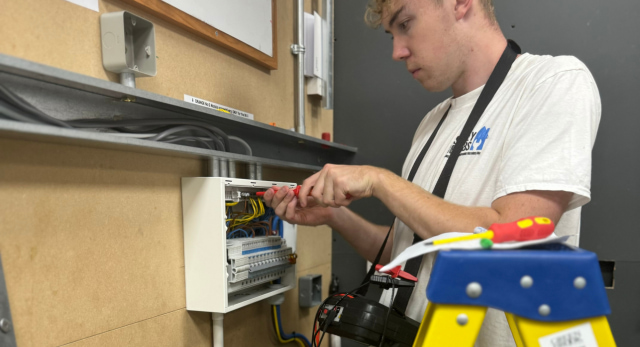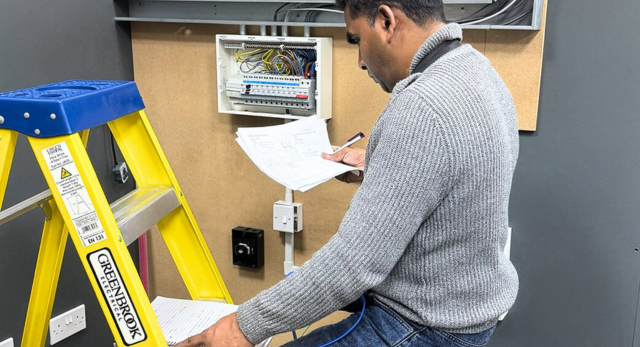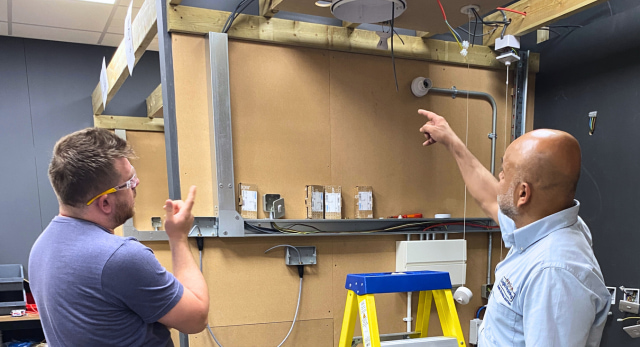Thinking about swapping your desk for a toolbox? Or maybe you’re already handy and want to level up your skills (and your pay packet)? Becoming an electrician in the UK is a smart move. Demand is sky-high, the work is varied, and there’s a clear path to getting qualified. But with so many routes and specialisms, it’s easy to get lost in the wires.
Thinking about swapping your desk for a toolbox? Or maybe you’re already handy and want to expand your skill set (and your pay packet)? Looking to become an electrician in the UK is a smart move. Demand is sky-high, the work is varied, and there’s a clear path to getting qualified. But with so many routes and specialisms, it’s easy to get lost in the wires.
Why Become an Electrician?
Let’s start with the big picture: electricians are in serious demand. The UK Trade Skill Index predicts that a total of 104,000 electricians are required by 2032 to keep up with the demands of the sector. The shortage is so acute that electricians are even harder to find than sales managers or executives and is a real headache for employers, but a golden opportunity for you.
What’s driving this demand? An ageing workforce heading for retirement, not enough new entrants, and a recent lack of accessible training and apprenticeship routes. In short: if you’re thinking about joining the trade, the timing couldn’t be better.
What Does an Electrician Actually Do?
It’s not just about changing lightbulbs (although you’ll probably do a few of those). Electricians install, test, and maintain electrical wiring, equipment, appliances, and fixtures in all sorts of settings-from homes to offices, schools to factories.
Here’s a taste of what your day-to-day could include:
- Reading and interpreting technical plans and wiring diagrams
- Planning the layout of wiring, sockets, and switches
- Installing fuse boxes, circuit breakers, and lighting systems
- Testing electrical systems and fixing faults
- Making sure everything meets the latest safety standards
Whether you fancy working on big commercial projects or prefer the variety of domestic jobs, there’s a niche for everyone.
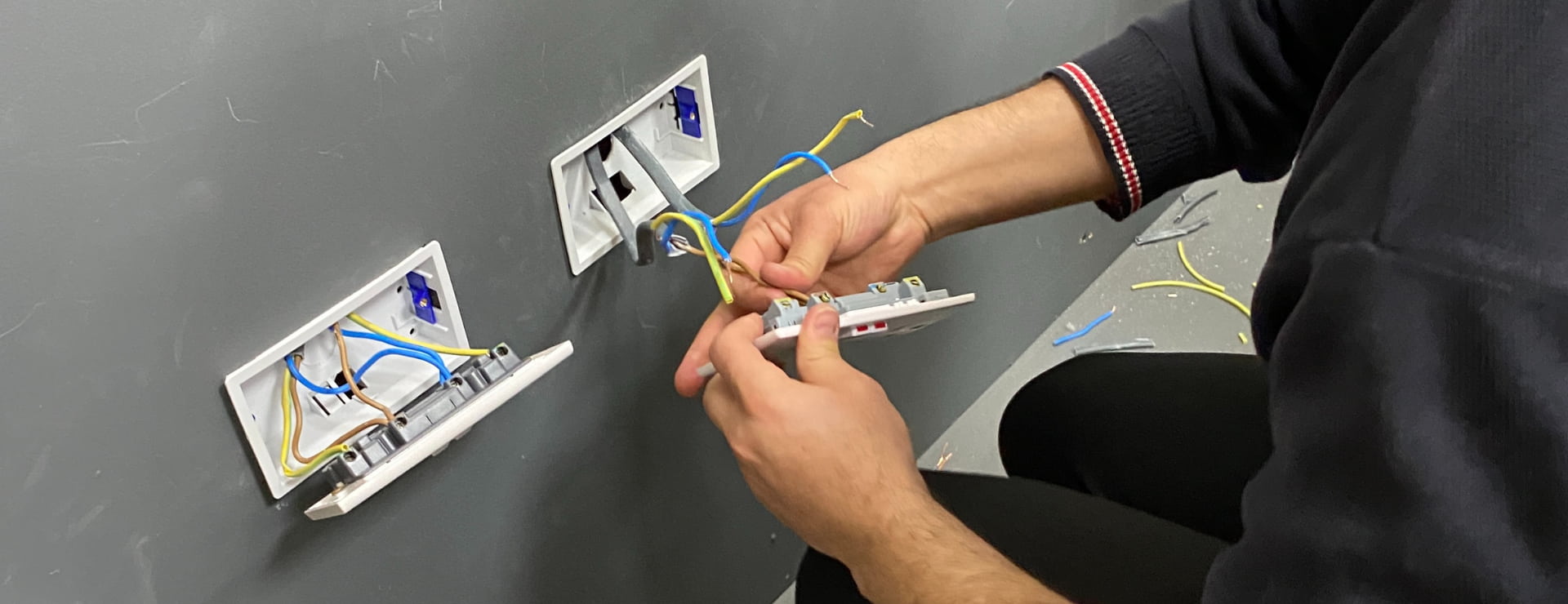
The Main Routes to Becoming an Electrician
There are a few different ways to qualify as an electrician, depending on your background, goals, and how much time you want to invest. Let’s break down the main routes.
1. The Apprenticeship Route (The Classic Way In)
If you’re starting out (or even if you’re a career changer with time on your side), an apprenticeship is the traditional route. You’ll combine on-the-job training with study at college or a training centre, usually over two to four years.
Key qualifications you’ll work towards:
- Level 3 NVQ Diploma in Electrotechnical Services (Electrical Maintenance)
- Level 3 NVQ Diploma in Installing Electrotechnical Systems & Equipment (Buildings, Structure and the Environment)
- Level 3 Diploma in Electrical Installations (Buildings and Structures) – typically as part of an apprenticeship
Why choose this route?
- You earn while you learn
- You get real-world experience (and contacts)
- You’ll be fully qualified for a wide range of electrical roles
Want to know more about apprenticeships? Check out our Ultimate Guide to Electrician Careers for a deep dive.
2. Domestic Installer Route (Perfect for Career Changers & Multi-Skilled Trades)
Not everyone wants, or needs, to spend years training. If you’re looking to work mainly in domestic settings, such as rewiring houses, fitting new sockets, or installing lighting, the New Entrant Domestic Electrical Installer Course is a popular and faster option.
What’s involved?
- Around four weeks of intensive training and assessment
- Covers all the basics: installation, safety, wiring, and more
- Ideal for those who want to work in domestic properties or add electrical skills to another trade (like gas installation)
Qualifications you’ll gain:
- Domestic Electrical Installer (Part P) – LCL Awards qualification
- 18th Edition Wiring Regulations – City & Guilds (2382-22, Level 3) qualification
- Initial Verification, Testing and Certification of Electrical Installations – LCL Awards Level 3 RQF qualification
What next?
At this point, you will need to make a decision as to whether you want to work towards joining a Competent Person Scheme (CPS) so that you will be able to certify your own work.
Currently, you are able to complete a Qualified Supervisor Qualification, such as our Level 3 Certificate in Installing, Testing & Ensuring Compliance of Electrical Installations in Dwellings and then apply to join a CPS. But as of March 2025, the EAS committee that manages the entry routes to Part P Competent Person Schemes made the decision in to remove the entry for an engineer to join a CPS as a Qualifying Supervisor (QS) who has completed the Level 3 Certificate in Installing, Testing & Ensuring Compliance of Electrical Installations in Dwellings.
The change will apply from the 1st January 2026. To join a CPS using the qualification you must have completed the qualification and have been awarded your certificate by 31st December. Post 1st January 2026, you will still be able to use the qualification for entry to the Experienced Worker Qualification to gain your L3 Domestic Electrotechnical Qualification and apply for a Domestic Electrician Gold Card and join a CPS (subject to other requirements, completing a portfolio and undertaking an AM2 assessment).
What do I need to do now? If you are able to undertake the course and complete your onsite work portfolio by the 31/12/25 then please contact us to check dates and book on, but you must be working on site and able to complete the onsite work portfolio by the end of November 2025 to ensure you can be certificated.
From 2026, Logic4training will be offering a route for engineers to undertake the Experienced Workers Qualification (EWQ) to gain their Domestic Electrician Gold Card and CPS.
3. Multi-Skilled and Add-On Electrical Training
Are you already in a trade, say, gas or plumbing, and want to add electrical skills to your repertoire? You don’t always need to go all-in. Learning safe electrical isolation and basic wiring can make you more versatile and save you from having to call in (and pay for) a subcontractor.
Logic4training offers tailored courses for:
- Safe electrical isolation
- Explore our range of electrical courses to find the right fit for your needs.
The Qualifications: What You Need (and Why)
Let’s break down the key qualifications you’ll come across as you train:
Level 3 NVQ Diploma in Electrotechnical Services (Electrical Maintenance)
- The gold standard for those wanting to work as fully qualified electricians, especially in commercial or industrial settings.
Level 3 NVQ Diploma in Installing Electrotechnical Systems & Equipment
- Focuses on the installation sidean great if you want to be hands-on with new builds or major projects.
Level 3 Diploma in Electrical Installations (Buildings and Structures)
- Often completed as part of an apprenticeship, this covers the essential skills for working on buildings and structures.
City & Guilds 18th Edition Wiring Regulations
- The industry bible. Every electrician needs to be up-to-date with the latest wiring regulations.
Part-P Domestic Installer
- Essential for anyone working in domestic properties-ensures you meet the legal requirements for electrical safety in homes.
LCL L3 Certificate in Installing, Testing and Ensuring Compliance
- Depending on your route, it is the next step after your initial training is a step in being able to join a Competent Person Scheme.
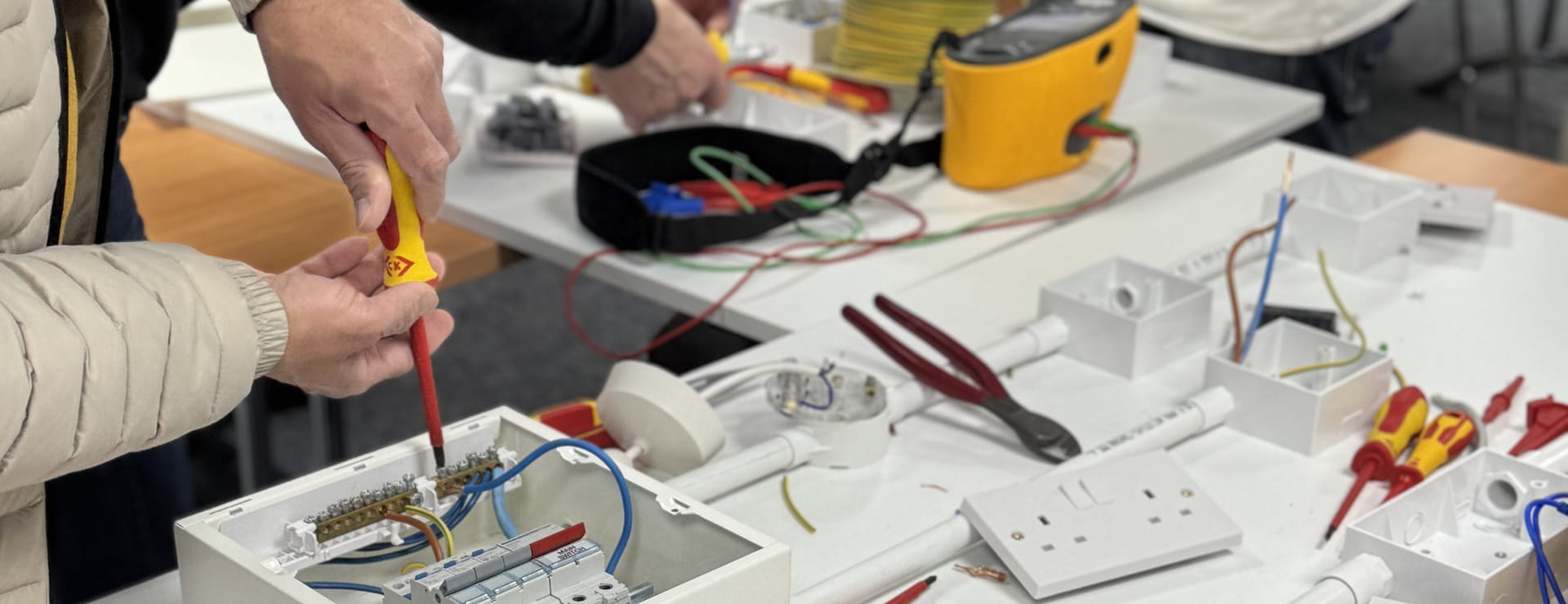
What About Specialising?
Once you’ve got your core qualifications, you can branch out into specialist areas like:
- Solar PV installation
- Electrical energy storage systems
- Electric vehicle charging points
- Inspection and testing
These often require additional training and certification. Logic4training offers a range of advanced electrical training and renewable training courses to help you upskill and stay ahead of the curve.
The Day-to-Day: What’s Life Like as an Electrician?
No two days are the same. One day you might be rewiring a Victorian terrace, the next you’re installing a state-of-the-art lighting system in a new build. You’ll need to be comfortable working on your own and as part of a team, solving problems, and keeping up with ever-changing regulations.
Key skills you’ll need:
- Good communication as you’ll be dealing with clients as well as colleagues.
- Attention to detail as nobody wants a dodgy socket!
- Problem-solving.
- Physical fitness as there’s a fair bit of crawling, lifting, and standing.
Salaries and Career Progression
Let’s be honest, money matters. The good news? Electricians are among the best-paid trades in the UK. Salaries vary depending on your experience, qualifications, and location, but once you’re qualified, you can expect to earn well above the national average. Plus, there’s plenty of scope to go self-employed, start your own business, or move into specialist areas. You can read more about electricain’s day rates, common jobs and workload to learn more.
How Do I Get Started?
Ready to take the plunge? Here’s your action plan:
- Decide which route suits you best (apprenticeship, fast-track, or add-on training)
- Check out our electrical courses for the latest options
- Call our team on 0208 8457222 for advice, or book a spot at one of our FREE introductory sessions
- Start your training and get ready for a rewarding, in-demand career
FAQ: Becoming an Electrician in 2025
How long does it take to become a fully qualified electrician?
It depends on your route. An apprenticeship typically takes 2–4 years, while the Domestic Installer course can be completed in around 4 weeks, followed by further training and portfolio building and so will take around 1-2 years, depending on your ability to learn and the spead at which you can build your portfolio.
Do I need an apprenticeship to become an electrician?
No, apprenticeships are a traditional route, but you can also take intensive courses like the New Entrants Domestic Electrical Installer Programme if you want to work mainly in domestic settings.
What qualifications do I need to work as an electrician?
You’ll need a Level 3 industry-recognised qualification, such as an NVQ or Diploma in Electrotechnical Services, plus up-to-date knowledge of the 18th Edition Wiring Regulations and, for domestic work, a Part-P qualification.
Can I add electrical skills to my existing trade?
Absolutely. Many gas installers, plumbers, and other tradespeople take short courses in safe electrical isolation and wiring to expand their skillset and offer more to clients.
Where can I find out more about Logic4training’s courses?
Visit our electrical courses page, call us on 0208 8457222, or book onto a free open day to get all your questions answered.
Ready to spark a new career? The UK needs more electricians, and with the right training, you could be one of them. Give us a call, check out our courses, and let’s get you started on the path to a brighter future.
